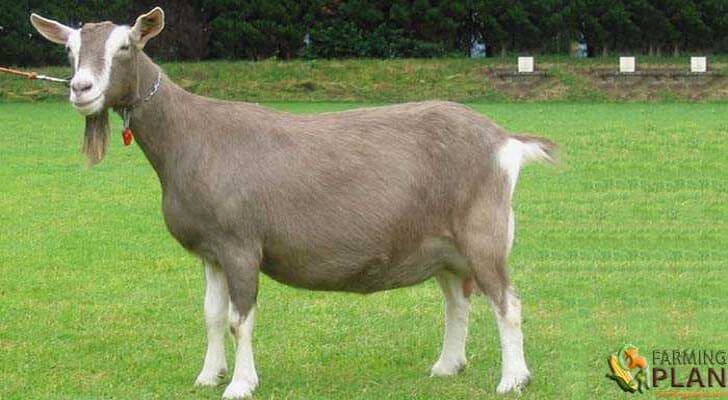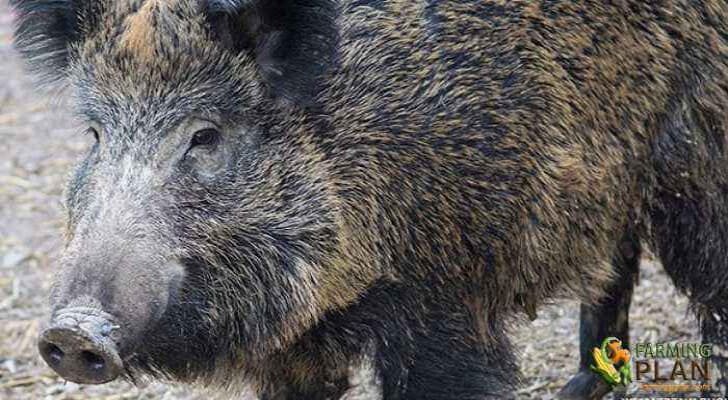The Lionhead Rabbit is one of the most distinctive rabbits you’ll ever meet. With its fluffy wool mane circling its head like a tiny lion, it’s no surprise this breed has captured the hearts of rabbit enthusiasts, pet lovers, and breeders worldwide. These confident, intelligent rabbits don’t just look adorable—they’re also friendly, playful, and easy to bond with. Whether you’re considering bringing one home as a pet or are curious about breeding Lionhead Rabbits, this guide will walk you through everything you need to know. From their fascinating history to daily care tips, we’ll explore what makes this domestic rabbit breed so special and how you can help your Lionhead live a healthy, happy life.
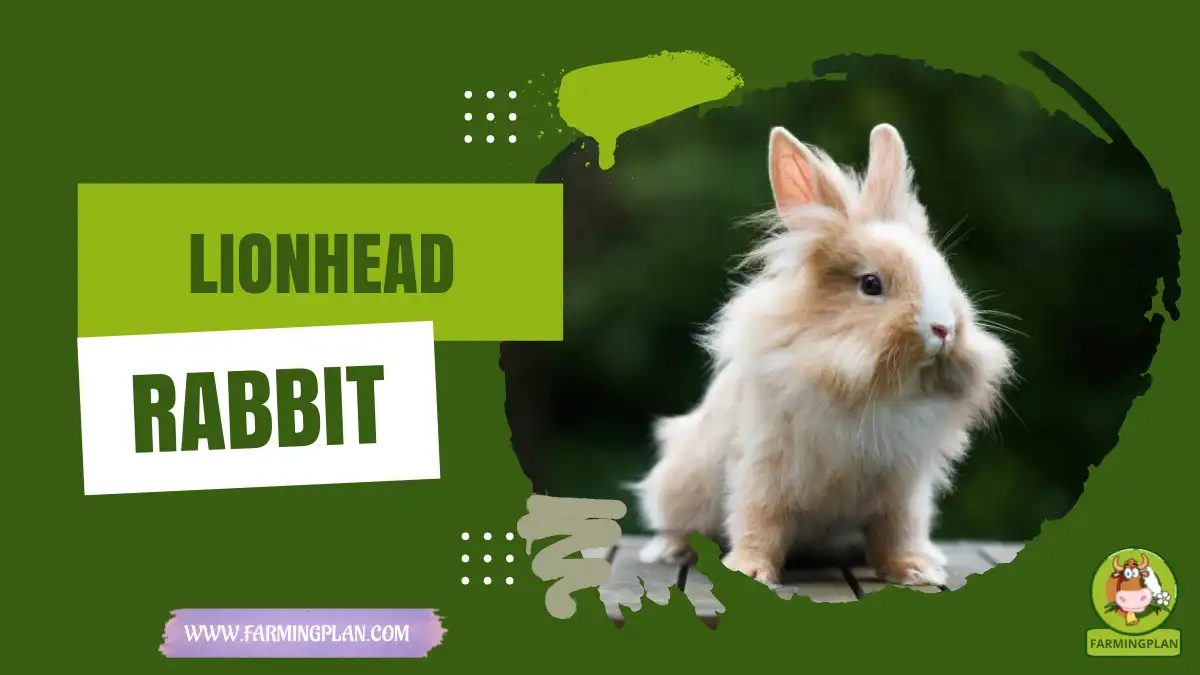
History & Origin
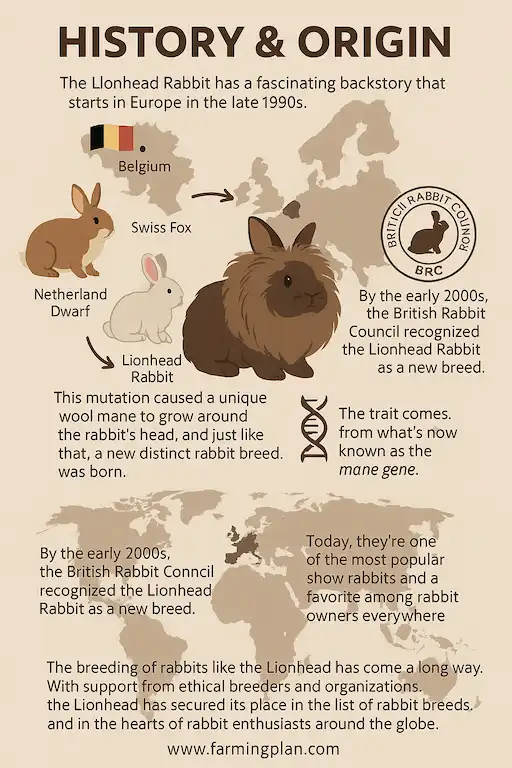
The Lionhead Rabbit has a fascinating backstory that starts in Europe in the late 1990s. Breeders in Belgium crossed a Swiss Fox rabbit with a Netherland Dwarf, and something unexpected happened—a genetic mutation. This mutation caused a unique wool mane to grow around the rabbit’s head, and just like that, a new distinct rabbit breed was born.
The trait comes from what’s now known as the mane gene. It creates a single or double-mane Lionhead Rabbit when passed down in certain combinations. These eye-catching rabbits quickly gained attention for their unusual look and soft fur.
By the early 2000s, the British Rabbit Council recognized the Lionhead Rabbit as a new breed. Their popularity grew fast in Europe, the U.S., and other parts of the world. Today, they’re one of the most popular show rabbits and a favorite among rabbit owners everywhere.
The breeding of rabbits like the Lionhead has come a long way. With support from ethical breeders and organizations, the Lionhead has secured its place in the List of rabbit breeds and in the hearts of rabbit enthusiasts around the globe.
Characteristics
The Lionhead Rabbit stands out because of its eye-catching wool mane, which gives it a “mini lion” look. This breed has a rounded head shape with a fluffy “V” of fur that starts from the head mount and flows around the neck like a halo. Some even describe it as a mane of wool that frames their entire head region.
This breed has two main types of manes: single mane and double mane. A single-mane Lionhead Rabbit has a thinner, lighter mane, while a double-mane Lionhead Rabbit has thicker fur that covers both the chest and flanks. When they are young, you can often tell a double mane by the noticeable V form around the neck.
This breed is a long-coated dwarf rabbit with a small, compact, well-rounded body type. Even as adults, they remain small in size. The average adult Lionhead usually weighs between 2.5 and 3.75 pounds, making it easy to handle and care for.
When it comes to color, they show off a wide range of colors, like chocolate, lilac, black, white, and even blue-gray. The background color and color pattern can vary, giving each rabbit its unique look. That’s part of what makes these distinctive rabbits fascinating to owners and breeders alike.
Nature & Temperament
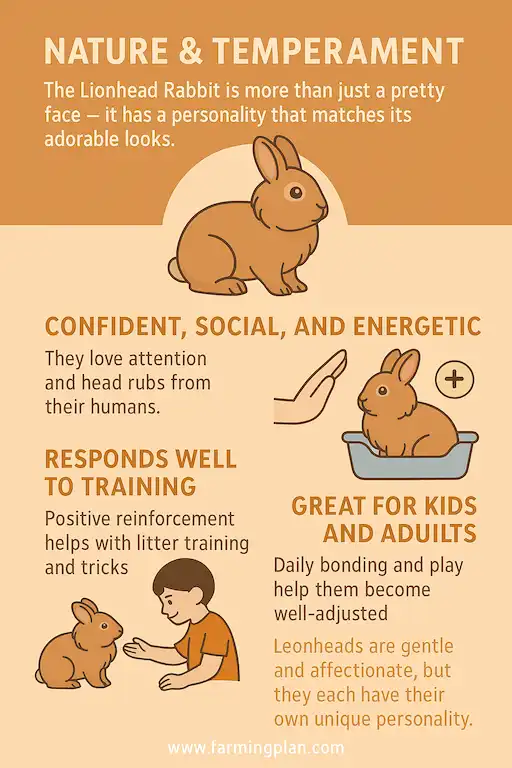
The Lionhead Rabbit is more than just a pretty face it has a personality that matches its adorable looks. These rabbits are known to be confident, social, and energetic. They love attention and often seek out head rubs and cuddle time with their humans.
Because they’re intelligent rabbits, they respond well to positive reinforcement training. With some patience and consistent training, you can litter-train them and even teach them simple tricks. They’re great at forming close bonds with their owners, especially when given lots of time to interact and explore.
Lionheads do well in homes with daily bonding time and plenty of play. They’re perfect for kids and adults and often become well-adjusted rabbits with the proper care and attention. Their curious nature means they’ll happily hop around your home, checking out every corner.
Just like people, every Lionhead has its unique vibe. Some are super outgoing, while others are more relaxed. But overall, they’re gentle and affectionate and make excellent companions.
Read More: American Chinchilla Rabbit: A Delightful and Versatile Pet
Food & Diet
Feeding your Lionhead Rabbit the right foods helps it stay active, strong, and full of life. Because they’re a domestic rabbit breed with a small size, what they eat affects their body weight and overall health.
Fresh hay is the most essential part of their diet—it should make up about 80% of what they eat daily. Hay helps wear down their upper teeth, which never stop growing. If they don’t chew enough, they can develop overgrown or even elongated teeth, leading to pain and serious dental issues.
You can also feed them high-fiber rabbit pellets and small amounts of fresh vegetables like leafy greens. Always avoid sugary fruits or processed snacks, as they can lead to weight loss or dental disease over time.
Make sure your rabbit always has access to clean, fresh water. A water bottle attached to their cage works great. Also, place a litter box in their space with non-clumping, rabbit-safe litter to help keep things clean and safe.
Stick to a consistent feeding schedule, and regularly monitor your rabbit’s body condition. If they stop eating or lose weight quickly, it could be a sign of a health condition, so you’ll want to talk to a vet immediately.
Usage & Purpose
The Lionhead Rabbit is a favorite among many for good reason. While it started as a show-stopping beauty in rabbit competitions, it has quickly become one of the top choices as a pet rabbit breed. These charming rabbits aren’t just for breeders—they make fantastic companions for families, kids, and seniors.
Many rabbit enthusiasts raise Lionheads for popular show rabbits because of their distinctive wool mane and compact body. Judges often look for features like a clean mane of wool, a symmetrical body, and confident behavior. With proper grooming and training, they can shine in shows.
Beyond shows and homes, some people keep small amounts of rabbits like Lionheads for breeding or educational purposes. Their friendly nature and unique look make them ideal for school projects, petting zoos, or 4-H youth programs.
Whether you’re a hobbyist, breeder, or first-time pet owner, the Lionhead fits right in. It’s a quality rabbit that offers more than just good looks—it gives love, joy, and a playful spark to your daily life.
Read More: Chinchilla Giganta Rabbit: Farming
Special Features
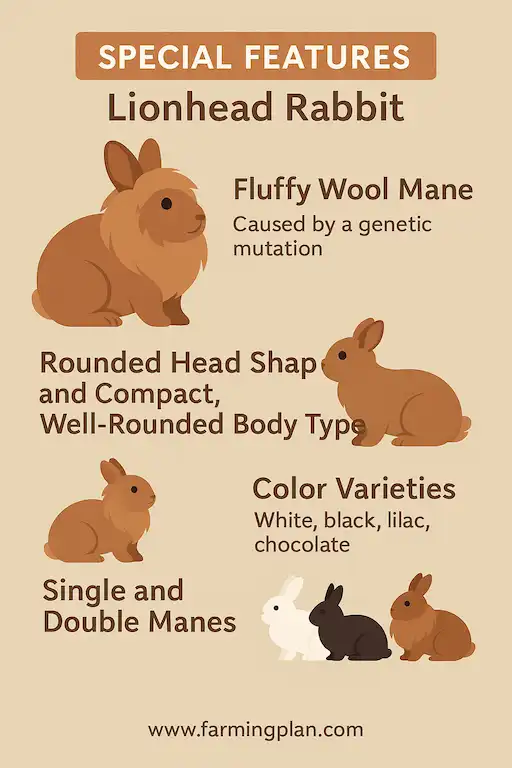
The Lionhead Rabbit stands out as one of the most distinctive rabbits in the world. Its fluffy wool mane, caused by a genetic mutation, is the breed’s signature trait. This mane sets them apart from other rabbit breeds and gives them that adorable, lion-like look from head to tail.
Another special feature is their rounded head shape and compact, well-rounded body type, which makes them look like little fluff balls. Many people fall in love with their sweet faces and curious expressions when they see them.
Lionheads also come in many color varieties, including standard colors like white, black, lilac, and chocolate. Their color pattern and background color give each rabbit a one-of-a-kind look, which adds to their appeal.
Aside from appearance, their personality is a real bonus. These rabbits are intelligent, social, and great at bonding time with humans. They’re also known for being brave and energetic—traits you don’t always see in small animals.
And don’t forget, you can find both single- and double-mane Lionhead Rabbits, each with a unique charm. The types of mane can help you identify their genetic background and even determine how much grooming they might need.
Health Issues & Prevention
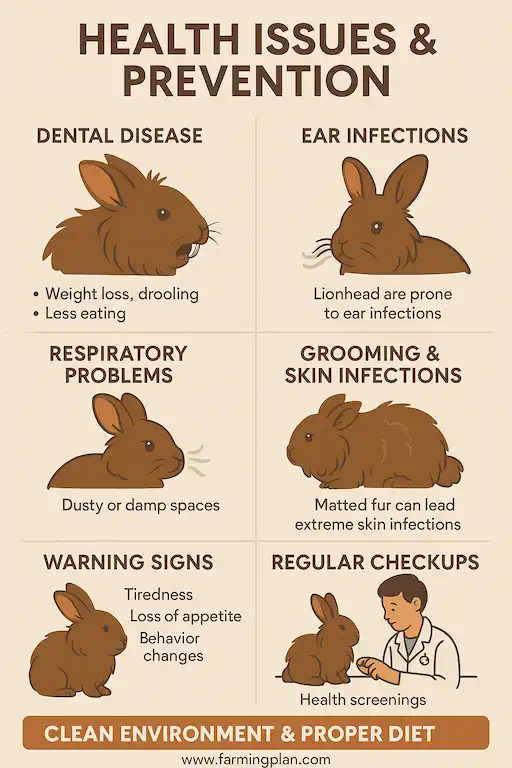
Like any domestic rabbit, the Lionhead Rabbit can face health challenges. Knowing the risks early helps you keep your rabbit healthy and energetic.
One of the most common problems is dental disease. Their upper teeth never stop growing, so they can develop elongated or even painful, overgrown teeth if they don’t chew enough hay. These issues can lead to weight loss, drooling, and less eating.
Lionheads are also prone to ear infections, especially if not groomed well. Sometimes, they might develop a head tilt, which could mean a deeper issue like a cuniculi parasite or sinus infection. Respiratory problems, such as respiratory infections, can happen if your rabbit lives in a dusty or damp space.
Grooming plays a big role in keeping your rabbit safe from skin infections, especially extreme skin infections caused by matted fur. A clean, dry space with proper bedding goes a long way in preventing these issues.
Always watch for signs like tiredness, loss of appetite, changes in droppings, or sudden behavior shifts. This could mean your rabbit is in rabbit pain or feeling sick. A regular checkup with a rabbit-savvy vet helps catch problems early. Vets may suggest health screenings based on your rabbit’s age and health history.
Keeping your rabbit’s space clean, feeding them right, and watching for symptoms will help them avoid the most common health issues and enjoy a long, healthy life.
Read More: Creme d’Argent Rabbit: Guide To Farming
Pet Owner Care Guide: Step-by-Step for a Happy Lionhead Rabbit
Caring for a Lionhead Rabbit is easy once you know the basics. Follow this step-by-step guide to help your bunny live a fun, healthy life.
Step 1: Choose the Right Space
Set up a safe, quiet area indoors with plenty of space. Use a large cage or pen, but let them out for daily playtime. Avoid placing them in loud or drafty rooms.
Step 2: Pick Safe Bedding and Litter
Line the floor with soft, absorbent materials. Use non-clumping, rabbit-safe litter in a corner litter box. Clean the litter daily to prevent smells and health conditions.
Step 3: Offer the Right Food Daily
Feed mostly fresh hay with a scoop of rabbit pellets. Add fresh leafy greens like romaine or parsley. Avoid junk foods, sugary treats, or anything unsafe.
Step 4: Provide Fresh Water
Give unlimited clean water in a bottle or heavy bowl. Refill and rinse it daily.
Step 5: Brush the Mane
The wool mane can get tangled. Use a soft brush a few times weekly, especially for double-mane Lionheads. This helps avoid mats and skin infections.
Step 6: Watch Their Teeth
Check for signs of overgrown teeth, drooling, or not eating. Feed hay daily to prevent dental issues. If you see problems, contact a vet.
Step 7: Handle with Care
When picking them up, support their hind legs. Be gentle. Give lots of head rubs and bonding time to build trust.
Step 8: Clean Their Space
Change bedding weekly and wash food bowls, water bottles, and toys. Cleanliness prevents common parasites and ear infections.
Step 9: Vet Checkups
Visit a rabbit-friendly vet once or twice a year for a complete check. Ask about vaccines and any signs of illness.
Step 10: Let Them Play
Give them safe toys, tunnels, and space to hop. They’re curious and playful, so let them explore with you nearby.
FAQ
Are Lionhead Rabbits good pets for families?
Yes, Lionhead Rabbits are friendly and social, making them suitable for families with older children who can handle them gently. They enjoy interaction and can form strong bonds with their owners.
How much grooming do Lionhead Rabbits require?
Lionhead Rabbits need regular grooming to prevent their mane from matting. Brushing them 2–3 times a week is recommended, and daily during shedding seasons.
What is the ideal diet for a Lionhead Rabbit?
A balanced diet for a Lionhead Rabbit includes unlimited hay, a moderate amount of fresh vegetables, and a small portion of high-fiber pellets. Avoid sugary treats to prevent dental issues.
Can Lionhead Rabbits live alone?
While Lionhead Rabbits can live alone, they are social animals and thrive with companionship. If kept alone, ensure they receive ample attention and mental stimulation.
What are common health issues in Lionhead Rabbits?
Common health concerns include dental problems due to misaligned teeth, respiratory infections, and gastrointestinal stasis. Regular veterinary check-ups and a proper diet can help prevent these issues.
Conclusion
Lionhead Rabbits are a distinctive and affectionate breed, known for their unique wool mane and engaging personalities. They require regular grooming, a balanced diet, and social interaction to thrive. With proper care and attention, Lionhead Rabbits can be delightful companions, bringing joy and charm to any household.

